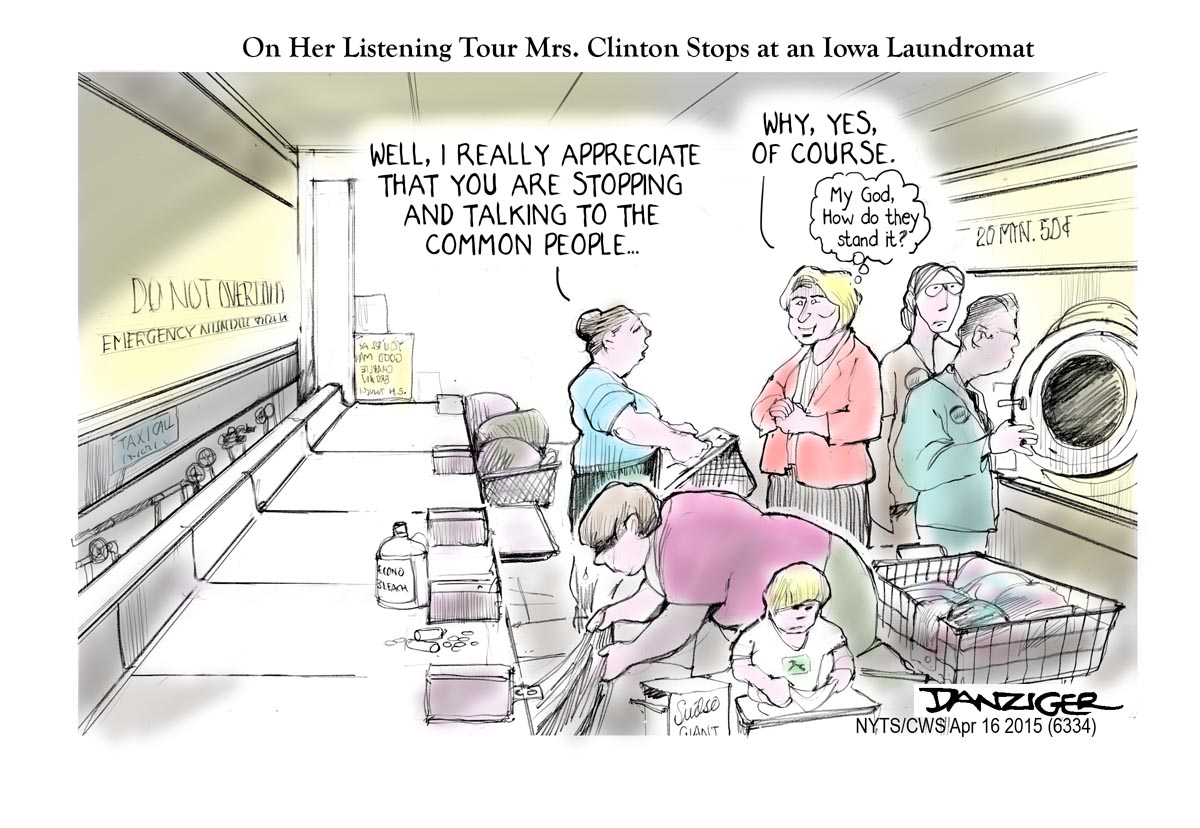Soon after Hillary Clinton announced her candidacy on April 12 for the 2016 presidential race, she and an entourage of advisers and Secret Service agents took off in a van named Scooby, after the 1970s animated Scooby Doo show, to meet the folks of the heartland.
Stopping off at a Chipotle restaurant in the Toledo suburb of Maumee, Ohio, USA TODAY reported that the former senator and secretary of state, after ordering a chicken burrito bowl, “left without anyone in the place giving her a second glance.”
The journalists in Washington, D.C., and New York City accorded her candidacy a more animated and vivid response. Writing for The New Republic (“There’s Nothing Inevitable about Hillary,” April 12) Rebecca Traister reported: “So what could possibly go wrong? Everything. Anything. Anything and everything. Hillary Clinton has loomed so powerfully in the American consciousness for so long that it’s hard to remember how delicate, how combustible, how ultimately improbable the project of electing her president is likely to be.”
Traister paid too little attention to Clinton’s individual flaws that could propel “anything” and “everything” to go wrong.
She devoted one sentence to list them: “She’s hawkish, she’s inauthentic, she’s a centrist, her ties with Wall Street are far too tight, she didn’t condemn her husband’s infidelities as sexual harassment.”
Writing from the heartland Susan Douglas, professor of communications at the University of Michigan, caught that spirit better in “Ready for a Woman, but not Hillary Clinton,” (In These Times, April 13): “…aren’t we overdue for a woman president?” Douglas asks. “Yes, but not just any woman (think Sarah Palin): one with genuine feminist and progressive sensibilities. For many of us in Clinton’s generation, feminism did not mean trying to be more like a man.”
Douglas observed that “We are reminded of seeming coldness there, opportunism, a lack of empathy with the 99% and a failure to channel female compassion.”
The trip in Scooby the van was intended to cast Clinton, the Toronto Star observed, “as a champion of ordinary Americans.”
Obama has disappointed—some say deceived—ordinary Americans on the economic help he promised. “During the post-recession period of 2009 and 2010, the rich snagged a greater share of total income growth than they did during the boom years of 2002 to 2007,” Matt Stoller blogged on Naked Capitalism, citing the work of Professor Emmanuel Saez at Berkeley.
And what about Hillary’s new and improved identity, that of a warm grandma who wants to help “children born in Appalachia or the Mississippi Delta or the Rio Grande Valley” have the same shot at success as her granddaughter Charlotte?
New York Times columnist Maureen Dowd suggested that Clinton donate some of that “obscene $2.5 billion that she’s planning to spend to persuade us to make her grandmother of the country” on those children.
Some ordinary Americans have figured out, by now, that there’s a nickel’s worth of difference between the two parties. They do not believe, with those who have made careers of political reporting and analysis, that—as Traister insists—“it matters very much to the future of this country who the next president is.” Under presidents from both parties since Ronald Reagan, the poor have gotten poorer and remained poorer and the rich have gotten richer.
Some Americans have learned that the world, including America, “is ruled by power and power is obtained with money.” Much of what the media do now is report on how politicians play the game.
